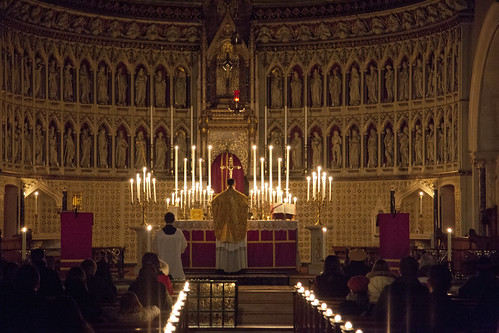 |
| Rorate Mass at the Oxford Oratory, England |
All the Church’s legislation needs to be understood in light of common sense, of previous legislation with greater authority, and of the Church’s the fundamental theological and moral principles. These principles of are of particular importance when we consider legislation which appears, on the one hand, to be hastily composed, and on the other, to have far-reaching, and perhaps unforeseen, consequences.
The Responsa provide a good illustration of this.
It appears that the Congregation for Divine Worship are not aware that, for historical reasons, that Rite of Communion for the Faithful used in the old Mass is not found in the 1962 Missale Romanum.
I noticed this when I was preparing the Latin Mass Society's Ordinary Prayers of the Traditional Mass. Up until the inter-war period Communion was not distributed at Mass, so the rite, which was used outside Mass, was and remains in the Rituale Romanum. This rite is used in Mass after the Priest's Communion. The Missal skips from that the Postcommunion Prayer.
This means that if the Rituale is forbidden for use, but the Missale is not, outside ‘personal parishes’, as the Responsa proposes, this would logically imply that the Faithful could not (outside a personal parish) receive Holy Communion at celebrations of the 1962 Missale. However, this conflicts with all three of the above-mentioned principles: common sense, previous legislation of greater authority (see Canons 213, 912, 918, 923), and the fundamental principle of the good of souls (see Canon 1752).
One thing this makes clear is the lack of understanding of the Traditional liturgy within the Congregation for Divine Worship. They don't seem to have people there with a thorough knowledge of the books and how they interact. The Fourth Section of the CDF, which used to deal with matters connected with the Old Mass, did have them, but these men have not been asked to join the CDW to assist the Prefect, Archbishop Roche, with these complicated matters.
Indeed, at one point, the Responsa actually denies the existence of a separate volume containing the 1962 Lectionary. They have never heard, evidently, of a useful little book, the Evangeliorum, often used at Solemn Masses by the Deacon for proclaiming the Gospel.
Equally, I strongly suspect that the officials at the CDW have little if any idea of the differences between the liturgical text used in the Lectionary, and what you will find in the Bible translations authorised for liturgical use in the Novus Ordo by Bishops' Conferences. The liturgical text is not always continuous; there are opening and occasionally ending formulae not found in the Scripture; and it is the Clementine Vulgate, which can differ significantly from the original texts translated by these Scripture translations.
But back to the Rituale. The fact is, the different books—the Missale, the Rituale, the Pontificale, the Breviary, and other books the CDF seems completely unaware of, such as the Ritus Servandus, the Manual of Prayers, and the Canon Pontificale, are inseparable components of the ancient liturgy which, as Pope Benedict noted, has never been abrogated. You can't just have one and not the others. It simply doesn't work like that.
These observations are not intended to prompt people to disobey the law as given. Rather, the point is to understand the law's real meaning. The meaning of a legislative text is conditioned by its wider legal and theological context, and the complexities of its subject matter. While the above illustration is a particularly clear example, this principle is applicable to the whole document, as it is to all ecclesial legislation.
Laws which have obviously ridiculous or harmful consequences, or which are confused, unclear, or impossible to implement, do not have force. I don't say: you can disobey them. I say: a proper understanding of them is that they do not have force.
"... I strongly suspect that the officials at the CDF have little if any idea..."
ReplyDelete"...and other books the CDF seems completely unaware of..."
Did you not mean the CDW? (not the CDF)
Thanks, corrected.
DeleteI believe that the CDF is also incorrectly mentioned in this paragraph:
Delete"But back to Rituale. In fact, the various books - the Missale, the Rituale, the Pontificale, the Breviary, and other books of which the CDF seems to be completely unaware, such as the Ritus Servandus, the Manual of Prayers...".
There may be nothing to disobey, but for an autistic person like me, the Old Rite has the security in that it is the same thing all the time. The Vatican are being simply Cruel.
ReplyDeleteI was 12 in 1962 and a altar server. Most Mass attendants weekday or Sunday did not receive Holy Communion. We Had a sung mass daily before school, all grades attended. During the priests communion a second priest would bring the Blessed Sacrament to a side altar and we would say the Lord I am not worthy in Latin x 3 the start receiving from him...
ReplyDelete